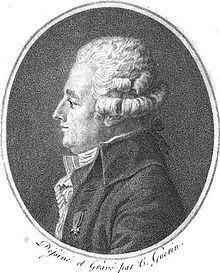Philippe Friedrich Dietrich
| Philippe Friedrich Dietrich | |
|---|---|
 |
|
| Mayor of Strasbourg | |
|
In office March 1790 – August 1792 |
|
| Preceded by | none |
| Succeeded by | Jean Turckheim (1792–1793) |
| Personal details | |
| Born | 14 November 1748 Strasbourg |
| Died |
29 December 1793 (aged 45) Paris |
| Political party | Girondin |
| Spouse(s) | Louise Sybille Ochs |
| Occupation | scientist, politician |
Baron Philippe Friedrich Dietrich, (also called fr: Philippe-Frédéric de Dietrich) born 14 November 1748 in Strasbourg, and guillotined on 29 December 1793 in Paris, was a scholar and Alsatian politician. He was most well known as the first mayor of Strasbourg who encouraged Rouget de l'Isle to write various patriotic songs, including the song which became known as La Marseillaise, first performed in his living room; he is also known as a scientist, author of a mine survey and the development blast furnaces in France, distinguished geologist and chemist, and member of the Academy of Sciences. As mayor of Strasbourg, he accelerated revolutionary reforms throughout the region.
Dietrich came from an old Protestant family of bankers and foundry owners in Niederbronn, in the Lower Rhine, and Reichshofen. The family was established in Strasbourg, with the 1549 birth of Dominique Didier, who was also known in this bi-lingual territory as Dominick Dietrich. His father, Jean Dietrich (1719–1795, comte Ban de la Roche), was the son of Johann von Dietrich, a foundry owner in Reichshofen. His mother, Amélie Hermanny (Anne-Dorothee Hermanni) (1729–1766), was the daughter of a prominent banker. He had one brother, Jean (1746–1805), who married Louise-Sophie de Glaubitz (1751–1806), and established the family's ironworks in Saint Domingue. His own son, Jean-Albert Dietrich (1773–1806), was counselor of Bas-Rhin; he married Amélie de Berckheim (1776–1855). His granddaughter married the nephew of his successor as mayor of Strasbourg, William Turckheim (1785–1831), colonel of cavalry in the French army.
Dietrich attended the Protestant gymnasium in Strasbourg and from 1772 continued his study through European travel. An encyclopaedist, and a Freemason, he embraced the Enlightenment ideals the development ideas of science and technology, gender differences in men without religion or origin, international understanding and peace among peoples.
...
Wikipedia
